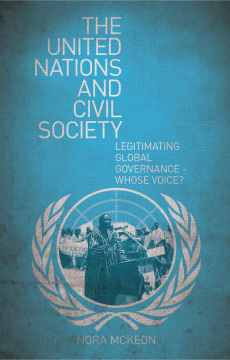
Additional Information
Book Details
Abstract
The UN is able to recognize key global challenges, but beset by difficulties in trying to resolve them. In this, it represents the current global political balance, but is also the only international institution that could move it forward.
Civil society can be a catalyst for this kind of change. In this book, Nora McKeon provides a comprehensive analysis of UN engagement with civil society. The book pays particular attention to food and agriculture, which now lie at the heart of global governance issues. McKeon shows that politically meaningful space for civil society can be introduced into UN policy dialogue. The United Nations and Civil Society also makes the case that it is only by engaging with organizations which legitimately speak for the 'poor' targeted by the Millennium Development Goals that the UN can promote equitable, sustainable development and build global democracy from the ground up.
This book has strong ramifications for global governance, civil society and the contemporary debate over the future of food.
'Nora McKeon's book is a masterful investigation of how and why the UN system is (slowly) opening up to civil society - a key development in global governance. This is a major contribution and a rare bridge between academic scholarship and policy debate'
Mario Pianta, University of Urbino
'This book is a tonic recipe for reinvigorating the UN by opening up its forums to the social actors most dramatically affected by globalization. This is required reading for all those concerned with global governance'
Henri Carsalade, Former Assistant Director-General of FAO
'Nora McKeon's reflections will, we hope, contribute to making the UN the organization of "we the peoples" '
Mamadou Cissokho, Honorary President, West African Network of Peasant and Agricultural Producers' Organizations (ROPPA)
Nora McKeon studied history at Harvard University and Political Science at the Sorbonne, before joining the Food and Agriculture Organization (FAO) of the United Nations. She held positions of increasing responsibility there, culminating in overall direction of the FAO's relations with civil society. She now divides her time between writing and lecturing on development discourse, peasant farmer movements and UN-civil society relations; and coordinating an exchange programme for African and European farmers on agriculture and trade policy issues. She recently published (with Michael Watts and Wendy Wolford) Peasant Organizations in Theory and Practice (2004).
Table of Contents
| Section Title | Page | Action | Price |
|---|---|---|---|
| Prelims\r | ii | ||
| About UNRISD | ii | ||
| About the author | ii | ||
| List of tables and boxes | vi | ||
| 1 Setting the Stage | 1 | ||
| Scope and Methodology | 2 | ||
| A World Context in Flux: Re-examining Global Governance | 5 | ||
| Global Actors in Evolution: From International NGOs to Transnational Social Movements | 8 | ||
| Getting the Terms Straight | 11 | ||
| 2 The FAO, Civil Society and the Global Governance of Food and Agriculture | 17 | ||
| Background | 17 | ||
| Civil Society and the World Food Summit | 23 | ||
| From Commitments to Action: In Pursuit of Elusive Political Will | 50 | ||
| Table 2.1 Areas of FAO–Civil Society Cooperation at Country Level, and Levels of CSO Involvement | 102 | ||
| Table 2.2 Types of CSOs with Which the FAO Cooperates at Country Level | 102 | ||
| The Global Food Crisis: A Political Opportunity for Civil Society? | 104 | ||
| By Way of Conclusion | 112 | ||
| 3 UN–Civil Society Relations: A Comparative Look | 121 | ||
| Civil Society Participation in Global Policy Forums | 124 | ||
| Box 3.1 Accreditation: Difficulties Encountered | 126 | ||
| Box 3.2 Accreditation: Good Practices | 127 | ||
| Civil Society and Summit Follow-up: Linking Global Commitments and Local Action | 133 | ||
| Governance of UN–Civil Society Relations: Interface Mechanisms and the Issues of Representativity, Legitimacy and Accountability | 141 | ||
| Box 3.3 How the UN Family Interfaces with Civil Society | 144 | ||
| Box 3.4 Interface Mechanisms: Difficulties | 148 | ||
| Box 3.5 Interface Mechanisms: Good Practices | 149 | ||
| Abbreviations | vii | ||
| Foreword | x | ||
| UN Reform Proposals, the Millennium Development Goals and Civil Society: Are We on the Right Track? | 157 | ||
| 4 Conclusions and Ways Forward | 169 | ||
| Major Challenges for the UN in Its Relations with Civil Society | 169 | ||
| Issues for Further Investigation | 184 | ||
| Notes | 190 | ||
| to chapter 1 | 190 | ||
| to chapter 2 | 192 | ||
| to chapter 3 | 209 | ||
| to chapter 4 | 214 | ||
| Bibliography | 216 | ||
| Websites | 226 | ||
| ANNEX: Cross-System Survey Responding Entities | 227 | ||
| UN Secretariat Departments and Programmes | 227 | ||
| Specialized UN Agencies | 231 | ||
| International Financial Institutions | 232 | ||
| Other | 235 | ||
| Index | 236 |
